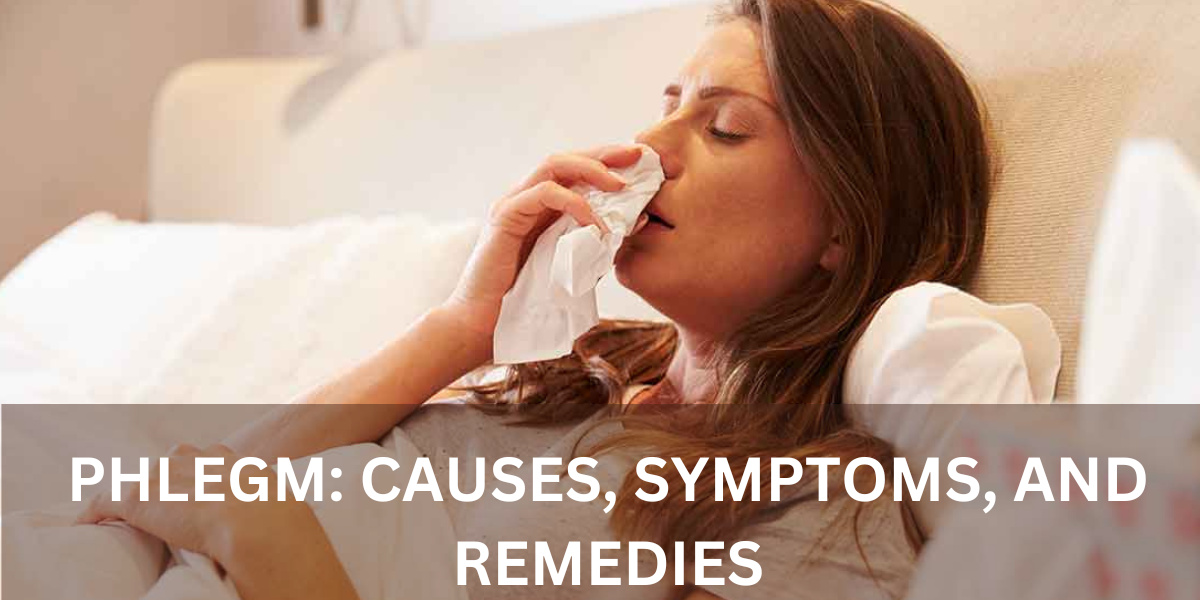Phlegm: Causes, Symptoms, and Remedies
Phlegm is a common respiratory condition that many people experience at some point in their lives. It is often associated with colds, flu, and other respiratory infections. In this article, we will delve into the topic of phlegm, exploring its causes, symptoms, and various remedies to alleviate discomfort. So, let’s dive in and gain a better understanding of this often bothersome condition.

Table of Contents
- Introduction
- What is Phlegm?
- Causes of Phlegm
- Symptoms of Phlegm
- Treatment and Home Remedies
- Prevention Tips
- Conclusion
- FAQs
1. Introduction
Phlegm, also known as mucus, is a sticky and thick substance produced by the mucous membranes in the respiratory system. It serves as a protective mechanism, trapping foreign particles, bacteria, and viruses, preventing them from reaching the lungs. While phlegm is a natural defense mechanism, excessive production or the presence of discolored or thickened phlegm can be a sign of an underlying respiratory condition.
2. What is Phlegm?
Phlegm is a gel-like substance that is primarily composed of water, glycoproteins, and immunoglobulins. It is produced by the respiratory system, including the nasal passages, throat, and lungs. Phlegm acts as a lubricant, keeping the respiratory system moist and preventing irritation. It helps to trap and eliminate harmful substances, such as bacteria and viruses, from the body.
3. Causes of Phlegm
Phlegm can be caused by a variety of factors, including:
3.1. Respiratory Infections
Respiratory infections, such as the common cold, flu, bronchitis, and pneumonia, can lead to increased production of phlegm. These infections cause inflammation in the respiratory tract, triggering the body’s defense mechanism to produce more mucus.
3.2. Allergies
Allergies to pollen, dust mites, pet dander, or certain foods can result in excess phlegm production. When the immune system identifies these substances as harmful, it releases chemicals that cause inflammation and increased mucus production.
3.3. Smoking
Smoking is a major cause of respiratory issues, including excess phlegm. The chemicals in tobacco smoke irritate the respiratory tract, leading to inflammation and increased mucus production.
3.4. Asthma
Asthma is a chronic respiratory condition characterized by inflammation and narrowing of the airways. People with asthma often experience excessive mucus production as one of the symptoms.
4. Symptoms of Phlegm
The symptoms of phlegm can vary depending on the underlying cause, but common symptoms include:
4.1. Coughing
Persistent coughing is a typical symptom of phlegm. The cough may be productive, with phlegm being expelled from the respiratory tract.
4.2. Congestion
Nasal congestion or a feeling of blockage in the chest are common symptoms associated with phlegm. This can lead to difficulty breathing and a sensation of heaviness.
4.3. Throat Discomfort
Phlegm can cause throat irritation, resulting in a scratchy or sore throat.
4.4. Chest Pain
Excessive coughing and congestion can cause chest pain and discomfort.
5. Treatment and Home Remedies
To alleviate phlegm-related symptoms, several treatment options and home remedies can be employed:
5.1. Stay Hydrated
Drinking plenty of fluids, such as water, herbal tea, and warm soups, helps to thin out phlegm, making it easier to expel.
5.2. Use Steam Inhalation
Inhaling steam from a bowl of hot water or taking a hot shower can help loosen mucus and relieve congestion.
5.3. Gargle with Saltwater
Gargling with warm saltwater can soothe a sore throat and reduce phlegm.
5.4. Use a Humidifier
Using a humidifier or vaporizer adds moisture to the air, which can help alleviate congestion and make breathing more comfortable.
6. Prevention Tips
While it may not be possible to completely prevent phlegm, certain measures can help reduce the frequency and severity of its occurrence:
6.1. Practice Good Hygiene
Washing hands frequently and avoiding close contact with people who have respiratory infections can reduce the risk of developing phlegm.
6.2. Quit Smoking
If you smoke, quitting can significantly reduce the chances of experiencing excessive phlegm and respiratory issues.
6.3. Maintain a Clean Living Environment
Regularly cleaning and dusting your living space can minimize exposure to allergens and reduce the likelihood of phlegm.
7. Conclusion
Phlegm is a common respiratory condition that can be caused by various factors, including respiratory infections, allergies, smoking, and asthma. It is important to understand the causes and symptoms to effectively manage and alleviate phlegm-related discomfort. By following prevention tips and employing treatment options and home remedies, individuals can take steps towards maintaining respiratory health.
8. FAQs
FAQ 1: Can phlegm be a sign of a serious health condition?
In some cases, the presence of excessive or discolored phlegm can indicate an underlying health issue. If you have concerns about your symptoms, it is recommended to consult a healthcare professional for a proper diagnosis.
FAQ 2: How long does phlegm typically last?
The duration of phlegm can vary depending on the cause and individual factors. In most cases, phlegm-related symptoms subside within a week or two. However, if symptoms persist or worsen, medical attention should be sought.
FAQ 3: Are there any over-the-counter medications for phlegm?
There are over-the-counter medications, such as expectorants and decongestants, that can help alleviate phlegm-related symptoms. However, it is advisable to consult a healthcare professional before using any medication.
FAQ 4: Can dietary changes help reduce phlegm production?
While there is no specific diet that can eliminate phlegm, consuming a balanced diet rich in fruits, vegetables, and fluids can support overall respiratory health.
FAQ 5: Is it necessary to seek medical attention for phlegm?
Most cases of phlegm can be managed with home remedies and self-care measures. However, if symptoms persist, worsen, or are accompanied by severe pain or difficulty breathing, it is important to consult a healthcare professional for further evaluation.